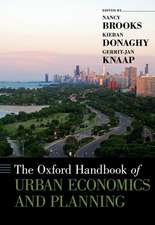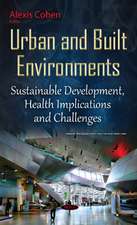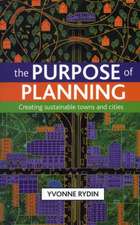Environmental Decision-Making in Context: A Toolbox: ASPA Series in Public Administration and Public Policy
Autor Chad J. McGuireen Limba Engleză Hardback – 25 apr 2012
The author highlights a primary set of intellectual tools from different disciplines and places them into an environmental context through the use of case study examples. The case studies are designed to stimulate the analytical reasoning required to employ environmental decision-making and ultimately, help in establishing a framework for pursuing and solving environmental questions, issues, and problems. They create a framework individuals from various backgrounds can use to both identify and analyze environmental issues in the context of everyday environmental problems.
The book strikes a balance between being a tightly bound academic text and a loosely defined set of principles. It takes you beyond the traditional pillars of academic discipline to supply an understanding of the fundamental aspects of what is actually involved in making environmental decisions and building a set of skills for making those decisions.
Din seria ASPA Series in Public Administration and Public Policy
- 8%
 Preț: 422.00 lei
Preț: 422.00 lei -
 Preț: 422.86 lei
Preț: 422.86 lei - 24%
 Preț: 429.98 lei
Preț: 429.98 lei - 28%
 Preț: 685.22 lei
Preț: 685.22 lei - 24%
 Preț: 324.17 lei
Preț: 324.17 lei - 15%
 Preț: 574.85 lei
Preț: 574.85 lei - 24%
 Preț: 430.38 lei
Preț: 430.38 lei - 24%
 Preț: 390.10 lei
Preț: 390.10 lei - 25%
 Preț: 355.49 lei
Preț: 355.49 lei - 25%
 Preț: 428.28 lei
Preț: 428.28 lei -
 Preț: 386.51 lei
Preț: 386.51 lei - 15%
 Preț: 501.39 lei
Preț: 501.39 lei - 15%
 Preț: 556.21 lei
Preț: 556.21 lei - 15%
 Preț: 573.20 lei
Preț: 573.20 lei - 15%
 Preț: 644.19 lei
Preț: 644.19 lei - 24%
 Preț: 390.51 lei
Preț: 390.51 lei -
 Preț: 322.27 lei
Preț: 322.27 lei - 15%
 Preț: 445.50 lei
Preț: 445.50 lei - 24%
 Preț: 486.76 lei
Preț: 486.76 lei - 24%
 Preț: 324.17 lei
Preț: 324.17 lei - 15%
 Preț: 675.68 lei
Preț: 675.68 lei - 15%
 Preț: 544.32 lei
Preț: 544.32 lei - 15%
 Preț: 470.56 lei
Preț: 470.56 lei - 15%
 Preț: 669.94 lei
Preț: 669.94 lei - 15%
 Preț: 592.63 lei
Preț: 592.63 lei - 15%
 Preț: 502.22 lei
Preț: 502.22 lei - 15%
 Preț: 569.94 lei
Preț: 569.94 lei - 15%
 Preț: 578.13 lei
Preț: 578.13 lei - 15%
 Preț: 573.23 lei
Preț: 573.23 lei - 15%
 Preț: 468.75 lei
Preț: 468.75 lei - 18%
 Preț: 1668.90 lei
Preț: 1668.90 lei - 21%
 Preț: 258.59 lei
Preț: 258.59 lei
Preț: 568.28 lei
Preț vechi: 668.57 lei
-15% Nou
Puncte Express: 852
Preț estimativ în valută:
108.77€ • 118.19$ • 91.43£
108.77€ • 118.19$ • 91.43£
Carte tipărită la comandă
Livrare economică 21 aprilie-05 mai
Preluare comenzi: 021 569.72.76
Specificații
ISBN-13: 9781439885758
ISBN-10: 1439885753
Pagini: 218
Ilustrații: 24 b/w images
Dimensiuni: 156 x 234 x 20 mm
Greutate: 0.45 kg
Ediția:1
Editura: Taylor & Francis
Colecția Routledge
Seria ASPA Series in Public Administration and Public Policy
Locul publicării:Oxford, United Kingdom
ISBN-10: 1439885753
Pagini: 218
Ilustrații: 24 b/w images
Dimensiuni: 156 x 234 x 20 mm
Greutate: 0.45 kg
Ediția:1
Editura: Taylor & Francis
Colecția Routledge
Seria ASPA Series in Public Administration and Public Policy
Locul publicării:Oxford, United Kingdom
Public țintă
Academic, Postgraduate, Professional, Professional Practice & Development, and UndergraduateCuprins
Introduction. Science. Natural Systems. Systems Thinking. Economics. Categories Relevant to Environmental Decision-making. Defining Value - linking environment and human interactions. Total Valuation Technique (TV = DV + N + NUV). Benefit-Cost Analysis. Values. Objective Values. Subjective Values. Scaling Value Decisions. Conclusion. Appendix (Supplement - Case Problems).
Recenzii
"The book’s main goal is to introduce the reader to theories, methods, and tools used in environmental decision making. … the author has kept this promise … a great introductory handbook"
—Agnieszka D Hunka, University of Twente, the Netherlands
"The book is a short beginner’s user manual to make sense of the complexity of sustainability assessments conclusions."
—Ricardo Teixeira, Marie‐Curie Post‐Doctoral Researcher, University of Antwerp, Belgium
—Agnieszka D Hunka, University of Twente, the Netherlands
"The book is a short beginner’s user manual to make sense of the complexity of sustainability assessments conclusions."
—Ricardo Teixeira, Marie‐Curie Post‐Doctoral Researcher, University of Antwerp, Belgium
Notă biografică
Chad J. McGuire is a professor of environmental policy within the Department of Public Policy at the University of Massachusetts, Dartmouth. He background is in environmental law and environmental science. Chad writes extensively in the fields of environmental law, policy, sustainability and dispute resolution. He has worked on policy issues related to fisheries management, climate change, globalization and land use patterns. His expertise has been sought in both private and public forums, and he has served on public committees for both non-profit and government entities. He has over 15 years of experience in the environmental management field.
Descriere
There is a constant drive for greater specialization when it comes to environmental problems. This book provides stakeholders from various backgrounds with the ability to place environmental problems and solutions within a common framework from which decisions can be made. It focuses on considerations from three primary areas of influence on environmental decision making: science, economics, and values. It presents the questions, issues, and problems that need to be addressed by today's environmental specialists. The text also includes case studies to illustrate the analytical reasoning required to employ contextually sound environmental decision-making.










